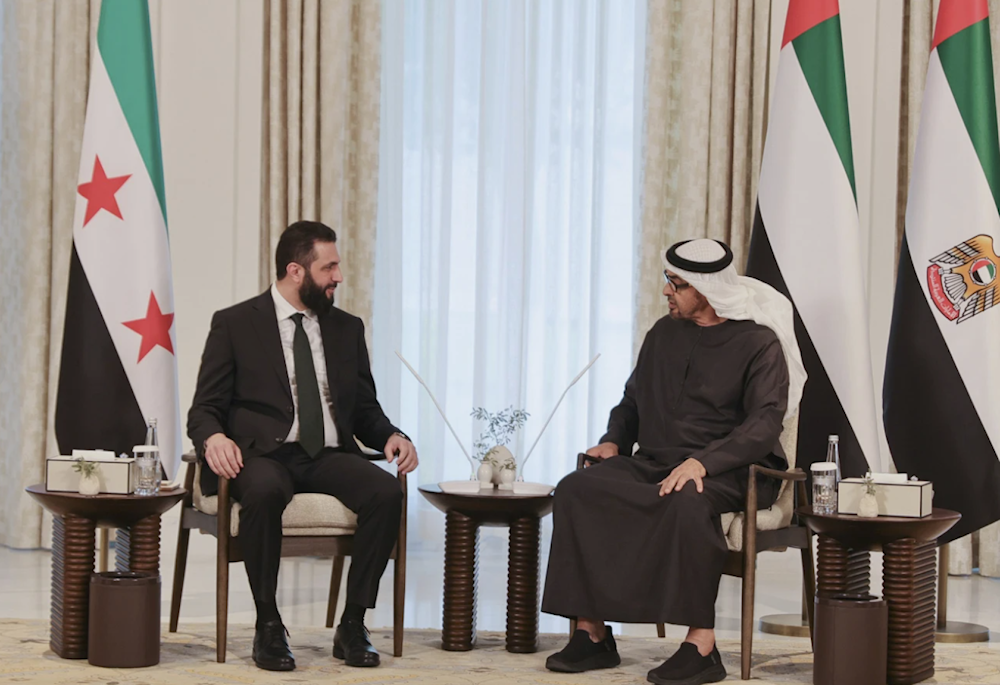Al-Dalati denies negotiating with 'Israel'
Senior Syrian security official al-Dalati denies involvement in negotiations with "Israel" amid reports of rare backchannel talks aimed at reducing tensions along the ceasefire line.
-

United Arab Emirates President Sheikh Mohammed bin Zayed al-Nahyan meeting with Syrian President Ahmad al-Sharaa in Abu Dhabi, United Arab Emirates on April 13 , 2025. (AP)
Ahmad al-Dalati, a senior security figure who assumed governorship of Quneitra, has officially denied participating in any negotiations with the Israeli occupation.
Al-Dalati rejected any participation with the Israeli side, affirming in a statement that such allegations are "baseless and lack even the slightest degree of accuracy and credibility," while emphasizing the Syrian state's position on this issue as "firm, clear, and not open to interpretation."
He added that the Syrian leadership continues to take all necessary measures to "protect the Syrian people and defend its sovereignty and territorial integrity," stressing "Syria's absolute commitment to its national principles and national constants."
Syria, 'Israel' holding backchannel talks on 'security coordination'
In a significant shift following years of hostility, “Israel” and Syria's interim government have held multiple face-to-face meetings in recent weeks aimed at reducing tensions along the 1974 ceasefire line, five sources familiar with the discussions told Reuters. The direct talks, described by the sources as unprecedented since the fall of Syrian President Bashar al-Assad, mark a quiet but notable recalibration in the region’s dynamics.
The secret meetings took place in the 1974 ceasefire line, including in territory occupied by the Israeli regime, and came amid a broader US effort to stabilize Syria’s frontier. They build on months of indirect backchannel negotiations conducted through intermediaries following the rise of Islamist forces in Damascus and the toppling of Assad in December by Hay'at Tahrir al-Sham (HTS).
According to two Syrian officials, two Western diplomats, and one regional intelligence source, the direct engagement represents a step toward deconfliction. On the Syrian side, talks are being led by Ahmad al-Dalati, a senior security figure who assumed governorship of Quneitra, which borders the occupied Golan Heights, shortly after al-Assad’s ouster.
Dalati was also appointed this week to oversee security in Sweida, a southern city with a predominant Druze majority with whom the transitional Syrian government had confrontations earlier this year.
Al-Sharaa engaging in talks with 'Israel'
While the identity of the Israeli participants remains undisclosed, two of the sources confirmed they were high-ranking security officials.
Earlier this month, Syrian interim president Ahmad al-Sharaa acknowledged indirect talks with “Israel” aimed at lowering tensions, a rare admission that followed reports of Emirati mediation. The meetings, however, have now progressed beyond indirect channels.
The Israeli regime occupied the Syrian Golan Heights during the 1967 war and expanded its control further after al-Assad’s fall, citing the radical origins of Syria’s new rulers as justification. Over the past decade, “Israel” has waged an extensive bombing campaign across Syria, targeting military infrastructure and lobbying the US to maintain Syria’s fragmentation.
Yet in recent weeks, those airstrikes have seen a sharp decline, and rhetoric from Tel Aviv has softened.
Analysts suggest the diplomatic shift was catalyzed by a landmark May 14 meeting between US President Donald Trump and al-Sharaa in Riyadh, which signaled a new American approach toward Damascus and indicated a desire for “Israel” to reach a modus vivendi with Syria’s new leadership.

 3 Min Read
3 Min Read










